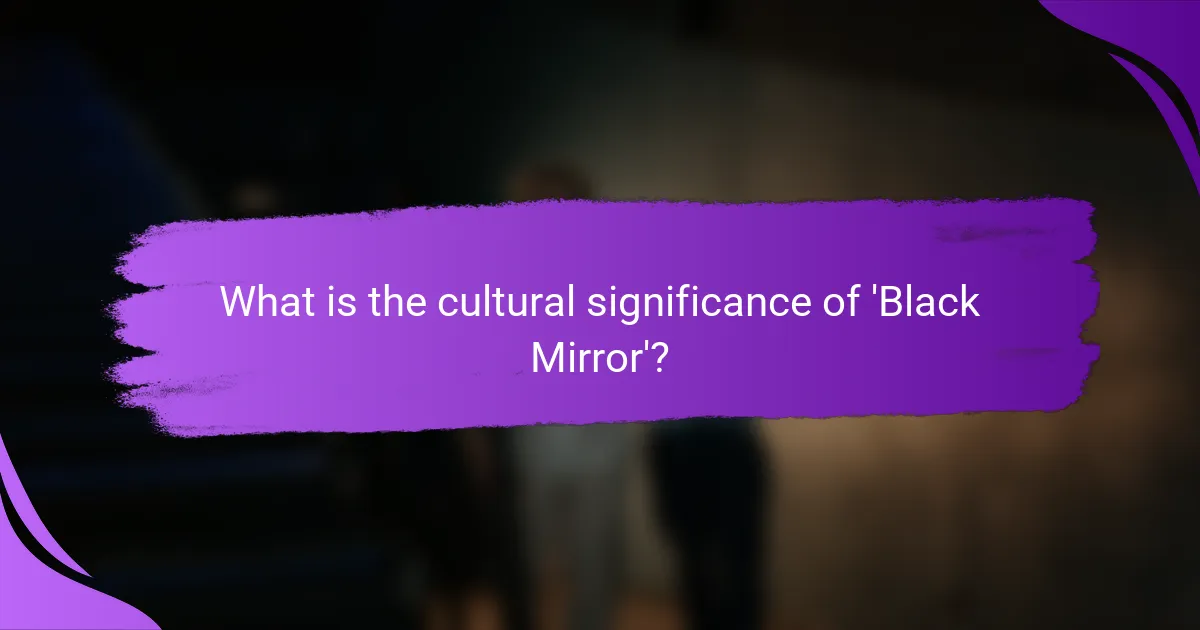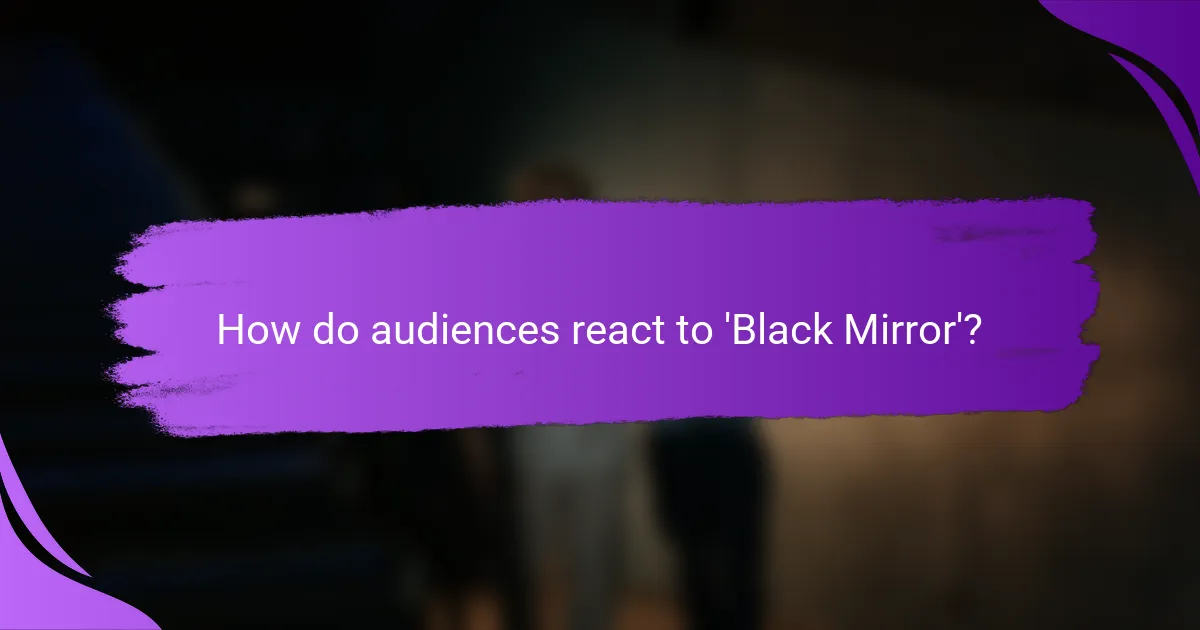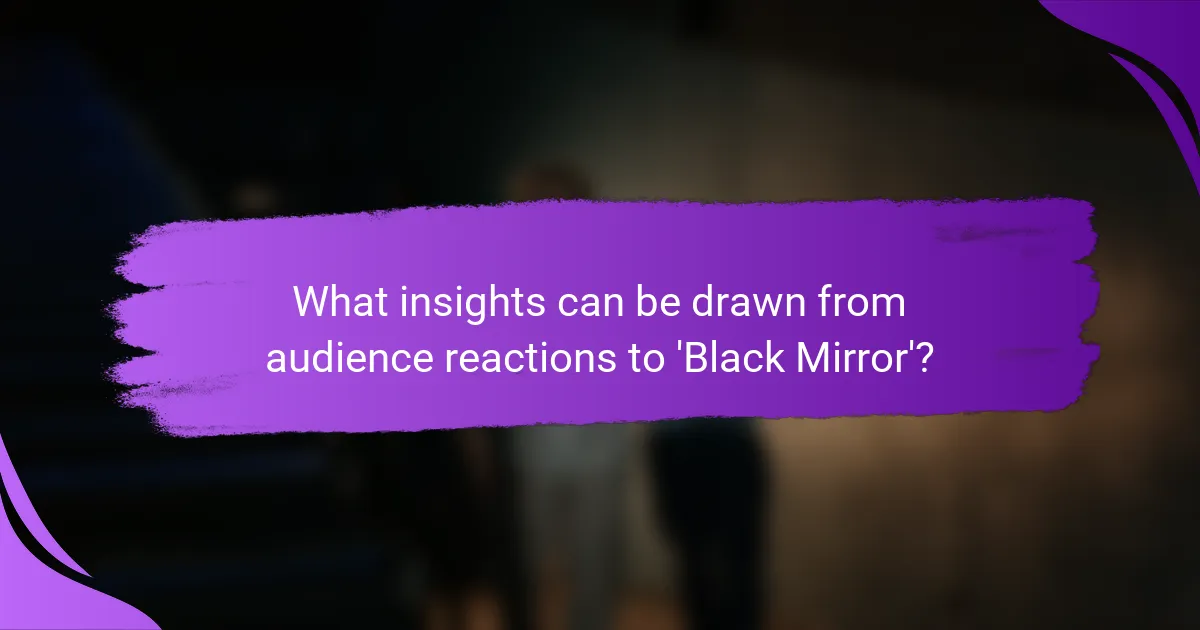‘Black Mirror’ is an anthology series that critiques the relationship between modern society and technology, addressing themes such as surveillance, social media, and artificial intelligence. The show serves as a cautionary exploration of potential futures influenced by technological advancements, reflecting societal anxieties about digital life and its effects on human relationships. Audience reactions reveal a blend of fascination and discomfort, with discussions centered around privacy, ethical dilemmas, and the emotional responses elicited by various episodes. The series has significantly impacted popular culture, prompting critical conversations about technology’s role in shaping contemporary fears and hopes.

What is the cultural significance of ‘Black Mirror’?
‘Black Mirror’ is culturally significant as it critiques modern society’s relationship with technology. The anthology series explores themes such as surveillance, social media, and artificial intelligence. Each episode serves as a cautionary tale about potential futures shaped by technological advancements. The show reflects societal anxieties regarding digital life and its impact on human relationships. Its provocative storytelling has sparked discussions about ethics in technology. Additionally, ‘Black Mirror’ has influenced popular culture and inspired similar narratives in other media. Its relevance continues as technology evolves rapidly, making its commentary increasingly pertinent.
How does ‘Black Mirror’ reflect contemporary societal issues?
‘Black Mirror’ reflects contemporary societal issues by exploring the impact of technology on human behavior and relationships. The series presents dystopian narratives that highlight concerns over privacy, surveillance, and social media’s influence. Episodes like “Nosedive” illustrate the dangers of social validation and digital reputation. “Fifteen Million Merits” critiques consumerism and the commodification of talent. The show often mirrors real-world events, such as the rise of deepfakes and data breaches. By exaggerating current trends, ‘Black Mirror’ prompts viewers to consider ethical implications. The anthology format allows diverse explorations of these themes, resonating with audiences grappling with technological advancements.
What themes are prevalent in ‘Black Mirror’ episodes?
Prevalent themes in ‘Black Mirror’ episodes include technology’s impact on society, human relationships, and dystopian futures. The series often critiques modern technology’s role in daily life. It explores the consequences of social media, surveillance, and artificial intelligence. Episodes frequently depict isolation and the loss of human connection. Another theme is the ethical implications of technological advancements. The show raises questions about morality in a tech-driven world. Additionally, it examines the fragility of reality and perception. These themes resonate with audiences, reflecting contemporary societal anxieties.
How do these themes resonate with current global events?
The themes of ‘Black Mirror’ resonate with current global events through their exploration of technology’s impact on society. Issues like privacy, surveillance, and social media addiction reflect real-world concerns. For instance, the rise of data privacy debates parallels episodes like “Nosedive,” which critiques social media validation. Additionally, the theme of dystopian futures in episodes such as “Fifteen Million Merits” echoes discussions about climate change and economic inequality. These connections highlight the relevance of ‘Black Mirror’ in understanding contemporary societal challenges. The series serves as a cautionary tale, prompting viewers to reflect on their relationship with technology amidst ongoing global transformations.
Why has ‘Black Mirror’ gained a dedicated fanbase?
‘Black Mirror’ has gained a dedicated fanbase due to its thought-provoking exploration of technology and society. Each episode presents a unique narrative reflecting contemporary issues. The anthology format allows for diverse storytelling, appealing to various viewer preferences. Its unsettling themes resonate with audiences, prompting discussions about morality and the future. The show’s ability to blend science fiction with real-world implications enhances its relevance. Critical acclaim and awards have further solidified its status in popular culture. Fans appreciate the show’s unpredictable twists and social commentary. This combination of factors creates a strong emotional connection with viewers.
What elements of storytelling contribute to its popularity?
Engaging characters contribute to the popularity of storytelling. Audiences connect emotionally with well-developed characters. Relatable experiences enhance this connection. Compelling plots also play a crucial role. Intriguing narratives keep audiences invested. Themes that resonate with societal issues attract attention. Storytelling that provokes thought encourages discussions. Unique perspectives can captivate diverse audiences. These elements combined create a rich storytelling experience.
How does audience engagement enhance the viewing experience?
Audience engagement significantly enhances the viewing experience by fostering a deeper connection between the audience and the content. Engaged viewers are more likely to invest emotionally in the narrative. This emotional investment leads to a heightened sense of immersion. Research shows that immersive experiences can increase viewer satisfaction. For example, studies indicate that engaged audiences tend to discuss and share content more actively. This sharing amplifies the reach and impact of the narrative. Additionally, audience engagement can influence content creators. Feedback from viewers often shapes future episodes and storylines. This responsiveness creates a dynamic relationship between creators and audiences.

How do audiences react to ‘Black Mirror’?
Audiences react to ‘Black Mirror’ with a mix of fascination and discomfort. Many viewers express intrigue due to its thought-provoking narratives. The series often reflects contemporary societal issues, sparking discussions on technology’s impact. Critics note that episodes evoke strong emotional responses, ranging from fear to empathy. Some audience members report feeling unsettled after watching, as the scenarios resonate with real-life possibilities. Social media platforms frequently feature debates about the themes presented in each episode. Overall, ‘Black Mirror’ prompts viewers to reflect on their relationship with technology and its implications.
What are common emotional responses to ‘Black Mirror’ episodes?
Common emotional responses to ‘Black Mirror’ episodes include anxiety, dread, and reflection. Viewers often feel anxiety due to the unsettling scenarios presented. The show’s themes provoke dread about the potential future of technology. Many individuals experience reflection on societal norms and personal values after viewing. Episodes often evoke feelings of sadness, especially in narratives involving loss or isolation. Some viewers express anger towards societal issues highlighted in the episodes. The emotional impact is amplified by the show’s realistic portrayal of technology’s consequences. Research indicates that ‘Black Mirror’ effectively stimulates discussions about ethics and morality in technology. These emotional responses contribute to the show’s cultural significance and viewer engagement.
How do viewers express their feelings about specific episodes?
Viewers express their feelings about specific episodes through various channels. They often utilize social media platforms to share opinions and reactions. Online forums and discussion boards are also popular for in-depth analysis and debate. Viewer ratings and reviews on streaming services provide quantitative measures of audience sentiment. Emotional responses are frequently conveyed through memes and fan art. Additionally, blogs and vlogs offer personal insights and critiques of episodes. These expressions reflect the cultural impact of the series and its themes. For instance, after the episode “San Junipero,” many viewers shared emotional testimonials about its portrayal of love and technology. Such feedback illustrates the deep connection audiences feel with the content.
What role does social media play in shaping audience reactions?
Social media significantly influences audience reactions by facilitating immediate feedback and engagement. It allows viewers to share opinions and interpretations of shows like ‘Black Mirror’ in real-time. This interaction can amplify emotional responses and create a sense of community among fans. Research indicates that 79% of social media users express their thoughts on TV shows online. Additionally, trending topics can shape perceptions, as public discourse often frames the narrative around a series. Social media platforms serve as a barometer for audience sentiment, impacting how shows are received and discussed.
Why do certain episodes provoke stronger reactions than others?
Certain episodes provoke stronger reactions due to their thematic depth and emotional resonance. Episodes that explore complex moral dilemmas tend to engage viewers more intensely. The incorporation of relatable characters and high-stakes situations amplifies emotional investment. For example, “San Junipero” elicits strong reactions because it confronts issues of love and mortality. In contrast, episodes with less relatable themes may not evoke the same level of response. Viewer demographics and personal experiences also influence reactions to specific episodes. Research indicates that emotional engagement correlates with narrative structure and character development. Stronger reactions often align with episodes that challenge societal norms or provoke self-reflection.
What characteristics make an episode particularly impactful?
An impactful episode often features strong character development. This allows viewers to connect emotionally with the characters. Engaging storytelling is crucial as it maintains audience interest and provokes thought. Themes that resonate with societal issues enhance relevance. High production quality, including cinematography and sound design, adds to the overall experience. Twists or unexpected endings leave a lasting impression on viewers. Critical acclaim and audience discussions can also amplify an episode’s impact. For instance, episodes like “San Junipero” and “Nosedive” sparked significant conversations about technology and humanity.
How do cultural backgrounds influence audience perceptions?
Cultural backgrounds significantly influence audience perceptions by shaping values, beliefs, and experiences. Different cultures interpret themes and narratives uniquely. For example, a viewer from a collectivist culture may focus on community impacts in ‘Black Mirror’ episodes. In contrast, an individualistic viewer might prioritize personal freedom and individual consequences. Research indicates that cultural context alters emotional responses to media. A study by Hofstede (1980) highlights how cultural dimensions like individualism versus collectivism affect interpretation. Thus, cultural backgrounds are essential in understanding diverse audience reactions to ‘Black Mirror.’

What insights can be drawn from audience reactions to ‘Black Mirror’?
Audience reactions to ‘Black Mirror’ reveal deep concerns about technology’s impact on society. Viewers often express anxiety regarding privacy, surveillance, and the ethical implications of artificial intelligence. The series prompts discussions about dystopian futures and the moral dilemmas posed by technological advancements. Audience feedback shows a mix of fascination and discomfort, indicating a strong emotional engagement with the content. Social media analysis highlights that episodes like “San Junipero” evoke hope, while others, such as “Nosedive,” generate fear. Critics note that the show’s ability to mirror societal issues fosters critical thinking. Overall, audience reactions suggest that ‘Black Mirror’ serves as a cultural barometer for contemporary fears and hopes surrounding technology.
How can understanding audience reactions inform future storytelling?
Understanding audience reactions can significantly inform future storytelling by providing insights into viewer preferences and emotional responses. Audience reactions reveal what themes resonate most and which narratives evoke strong feelings. For instance, analyzing social media discussions and reviews can highlight specific episodes that sparked intense debate or engagement. This data allows storytellers to refine their approaches, focusing on elements that generate interest. Furthermore, studies show that stories addressing contemporary issues, like technology’s impact, often lead to greater viewer connection. By leveraging audience feedback, creators can develop more relevant and impactful narratives that align with societal concerns.
What lessons can creators learn from viewer feedback?
Creators can learn that viewer feedback is essential for improving content. Feedback highlights audience preferences and interests. It can guide creators on which themes resonate most. Specific comments can reveal strengths and weaknesses in storytelling. Analyzing viewer reactions helps refine future projects. For example, ‘Black Mirror’ received varied feedback on its episodes. This feedback influenced the direction of subsequent seasons. Understanding viewer sentiment can enhance engagement and loyalty. Overall, feedback serves as a valuable tool for growth and adaptation.
How might audience reactions shape the direction of future seasons?
Audience reactions can significantly influence the direction of future seasons. Producers often analyze viewer feedback to gauge which themes resonate. Positive reactions may encourage the exploration of similar narratives. Conversely, negative feedback can prompt a shift in storytelling approaches. For instance, after Season 5, audience criticism led to discussions about revisiting more thought-provoking content. Data from social media and ratings provide concrete insights into audience preferences. This feedback loop helps creators align with viewer expectations and cultural relevance. Thus, audience reactions are pivotal in shaping the creative trajectory of future seasons.
What practical tips can viewers apply when engaging with ‘Black Mirror’?
Viewers engaging with ‘Black Mirror’ should approach each episode critically. Analyze the themes and societal implications presented. Consider the technology depicted and its real-world parallels. Discuss episodes with others to gain diverse perspectives. Reflect on personal experiences related to the topics explored. Take breaks between episodes to process complex narratives. Research background information on the creators and inspirations for the series. These practices enhance understanding and appreciation of the show’s cultural significance.
The primary entity of this article is ‘Black Mirror’, an anthology series that critiques modern society’s relationship with technology. The article examines the cultural significance of ‘Black Mirror’, highlighting its exploration of themes such as surveillance, social media, and artificial intelligence, and how these themes resonate with contemporary societal issues. It also discusses audience reactions, emotional responses, and the impact of viewer feedback on storytelling, emphasizing the show’s role as a cultural barometer for technology’s ethical implications and societal anxieties. Key insights into how audience engagement shapes future narratives are also presented, alongside practical tips for viewers to enhance their engagement with the series.